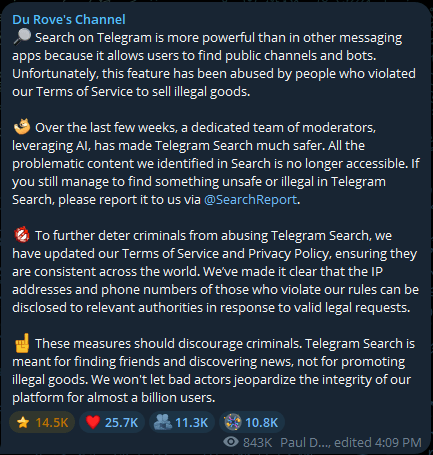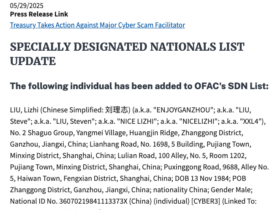
Telegram CEO Pavel Durov announced significant updates to the app’s Terms of Service and Privacy Policy, aimed at bringing the popular communications platform in alignment with the request of authorities to bring criminal activity under control. Most notably, Telegram will now share user IP addresses and phone numbers when responding to valid legal requests.
Putting a break to misuse
Telegram’s search function, which allows users to discover public channels and bots, had been misused by bad actors to facilitate illegal transactions. To counter this, Telegram has recently deployed a team of moderators supported by artificial intelligence (AI) that will help create a safer environment by removing problematic content from search results. Users are now encouraged to report any suspicious content through the @SearchReport bot, indicating a heightened focus on community-led safety.
Furthermore, those who continue to use Telegram Search for nefarious purposes or create entries that concern illicit material will be flagged for ToS violations no matter where they’re based in, as the terms will now be harmonized for consistency on all markets. If those violators are subject of criminal investigations, Telegram will now hand over their details to the respective authorities.
“To further deter criminals from abusing Telegram Search, we have updated our Terms of Services and Privacy Policy, ensuring they are consistent across the world,” stated Durov.
“We’ve made it clear that the IP address and phone numbers of those who violate our rules can be disclosed to relevant authorities in response to valid legal requests.


Despite these steps, users wanting to hide their IP address can still use a reputable VPN service. This will effectively hide your IP address when the VPN is connected.
Telegram forced to take action
Launched in 2013, Telegram has become a vital communication tool for nearly a billion users worldwide, and simultaneously gained a reputation as a hotspot for cybercriminals, offering channels for illicit activities ranging from drug trafficking to the sale of malware. Despite repeated requests for improved moderation, Telegram continued to maintain what was arguable a lax stance toward illegal content, serving as a kind of a “gray zone” in mainstream communication platforms.
Last month, Pavel Durov was arrested in France upon arrival at Le Bourget airport, and the Paris Public Prosecutor’s Office charged him with complicity in facilitating illegal activities via the platform, refusing to aid law enforcement in cybercrime investigations, and other serious offenses. These allegations, compounded by claims that Telegram’s API is used to host command-and-control servers for malware operations, have painted a bleak picture of the platform’s association with criminal elements, so the time for real action has came.
The updates to Telegram’s policies signal a shift in its approach to user data and legal cooperation, as Durov acknowledged that more needs to be done to protect its reputation and community. Although to the revised Terms of Service is a solid step to that direction, Telegram enforcing the rules is a whole different matter, so that aspect remains to be seen.
Ultimately, stricter terms of service and aggressive enforcement could lead to many users opting to migrate to platforms that don’t log sensitive data at all. Meanwhile, the ongoing legal proceedings against Durov cast doubt on these compliance efforts, eroding users’ trust in Telegram’s ability to deliver on its promise of being a secure and privacy-focused communication tool.















